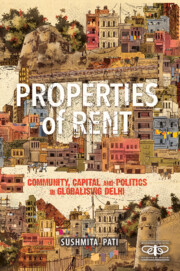Book contents
- Frontmatter
- Contents
- List of Maps and Figures
- Acknowledgements
- List of Permissions
- List of Abbreviations
- Units of Measurement
- Maps
- Introduction
- 1 Creating Values of Land: Law, Records and Kabza
- 2 From Buying Land, Owning Taxis to Becoming Landlords: The Changing Economic Landscape of Villages
- 3 Villages of the City: Ordering Spaces and Aspirations in Neoliberal Times
- 4 In the Shadows of the State: Community as a Mode of Political and Economic Organisation
- 5 Culture, Gender and Belongingness? City and the Violence of Rent
- 6 The Fringes of the Cartel: How the Marginalised Become Landlords
- 7 The Allure of Politics: The Candidates, the Cadre and the Euphoria of Elections
- Epilogue
- Glossary
- Bibliography
- Index
6 - The Fringes of the Cartel: How the Marginalised Become Landlords
Published online by Cambridge University Press: 31 March 2022
- Frontmatter
- Contents
- List of Maps and Figures
- Acknowledgements
- List of Permissions
- List of Abbreviations
- Units of Measurement
- Maps
- Introduction
- 1 Creating Values of Land: Law, Records and Kabza
- 2 From Buying Land, Owning Taxis to Becoming Landlords: The Changing Economic Landscape of Villages
- 3 Villages of the City: Ordering Spaces and Aspirations in Neoliberal Times
- 4 In the Shadows of the State: Community as a Mode of Political and Economic Organisation
- 5 Culture, Gender and Belongingness? City and the Violence of Rent
- 6 The Fringes of the Cartel: How the Marginalised Become Landlords
- 7 The Allure of Politics: The Candidates, the Cadre and the Euphoria of Elections
- Epilogue
- Glossary
- Bibliography
- Index
Summary
Writing about cooperation and solidarity means writing at the same time about rejection and mistrust.
—Mary Douglas, How Institutions ThinkLakshmi is a woman in her seventies who belongs to the Nai community. She came to Munirka as an 11-year-old bride in the 1960s. Her husband had a barber shop in Tilak Nagar, West Delhi, before he got a job with the Central government. When I spoke to her, Lakshmi seemed oddly fixated on high-lying areas ‘jahan paani nahi jamta’. She muses that the capital was moved to Delhi from Calcutta only because the city is situated at a height and therefore water does not stagnate in Delhi. Munirka, according to her, is also a far better place than a suburb like Dwarka for the same reason. Even her memories of her natal place, a village near Palam, are strongly tied to recollections of waterlogging. This impression of a relationship between topography of land and its value stood out for me during our conversation because it was so unique. No other person I had spoken to had made such associations.
I soon got a better sense of the reason for Lakshmi's preoccupation with low-lying areas and waterlogging. She owns a building right in the middle of Munirka village, which one can access only after crossing several meandering narrow lanes. Left to myself, I would never be able to trace my steps back to her house. She lives with her son on the ground floor of the same building. The floors above have been rented out. There is no separate entrance, so there is a constant flow of people going up and down through the living room. In order to ensure that the lanes were not awash with rain and sewage water during the monsoons, resurfacing was done repeatedly to make them higher, so much so that Lakshmi's ground floor has now sunk to a level below that of the lane. This is not a problem unique to Munirka. Unauthorised coloniesacross Delhi, built on cheaper, unused, low-lying land increasingly suffer from the same issue. Lakshmi's house faces chronic seepage on the ground floor, and she fears that the entire structure and its foundation have considerably weakened.
- Type
- Chapter
- Information
- Properties of RentCommunity, Capital and Politics in Globalising Delhi, pp. 174 - 198Publisher: Cambridge University PressPrint publication year: 2022



